Okay, where has this blogger been for the last 5 months and how do those daily bloggers do it?? No excuses here. LIFE got in the way of my original intentions a bit, as you can see. Anyway...
It has been an incredible almost half a year in the 2 middle school classrooms that we serve. Getting to know the students and establishing a routine were not difficult but that did take about a month. One of the biggest reasons it took more time that I had predicted is that when you are working with a therapy dog it can be very intense for the handler to attend to the both the setting as well as the dog. In our situation, it was imperative that I closely watch Zen's body language at all times those first sessions. Any sign that Zen was confused, anxious, or uncomfortable in this highly distracting setting had to be addressed immediately.(I used positive reinforcement with clicker training - more about that in another post.)
My biggest concerns have always been about Zen's reactions to some of the students' behaviors. Individuals with autism and other handicapping conditions may demonstrate behaviors that are not what the average dog would be accustomed to seeing, hearing, and smelling. As most Doberman owners know, this breed is highly sensitive to the slightest human behavior that differs from the "norm". They have been bred to be guard dogs and, as such, are often suspect of people who communicate or act in novel ways. This special sensitivity to novel stimuli can present a challenge in a classroom of special-needs students and, in fact, it did on several occasions - again, training opportunities for us and look how well it worked out!
In addition to the students we specifically serve who may suddenly decide to bounce vigorously on very large exercise balls, rock upside down in odd chairs on the floor, or make sudden and swift large body movements we also have what I, as a former teacher of students this age, call the middle school factor. This is a simple thing to grasp if you just stand in the lobby of a middle school at the change of classes; the students are incredibly loud and very impulsive. The building fairly pulses with youthful energy at all times and, at any moment, a group of happy chattering (did I say loud?) students is apt to surround your dog and want to meet/greet/pet him! I learned that just coming in the building and getting to the classrooms every week required that we be "on duty". At first it was pretty hairy because I had no idea how Zen would react to this swiftly changing environment so I had to be vigilantly tuned in every moment. I also learned to come at least 30 minutes early because it was inevitable that students passing in the hallways would want to interact with Zen. This turned out to be a wonderful thing for both of us and Zen now loves being mobbed by any and all students. This acceptance was not without a bump or two along the way, which we took as even more training opportunities.
Okay, to wrap up this entry, I just want to emphasize a couple of things. When considering a dog for therapy work, start with innate personality. Does the dog absolutely crave human interaction? Great!
Is the dog calm and steady by nature? Fantastic!
Is the dog well trained? Imperative!!!
All therapy dogs should be very well trained!!! Handler and dog should take a good training class especially for Therapy Dogs + achieve certification by a reputable Therapy Dog organization. This is imperative as a baseline for entering any therapy dog setting. In addition, the handler must be willing to be vigilant with on-going training as the therapy work presents new challenges. All dogs have the potential to react with undesirable behaviors if they interpret a situation as dangerous to themselves and/or their humans. Therapy dogs are often exposed to very unusual situations which can trigger unusual reactions. Learn all you can about canine body language (YES! They do "speak" with their bodies all the time!) and, when working in a therapy situation, stay alert at all times to your dog's body language
Zen's main goal in life is to give and receive LOVE, so that is what brings us to the school every week and that characteristic should be the first criteria for deciding if your dog would be a good Therapy Dog!
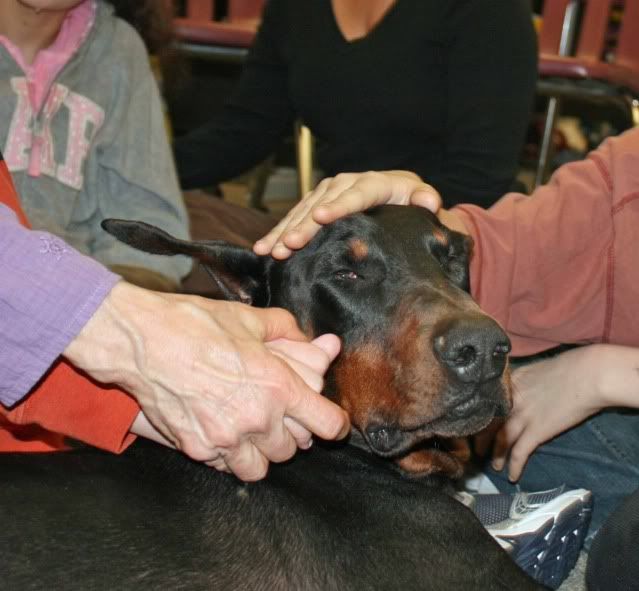
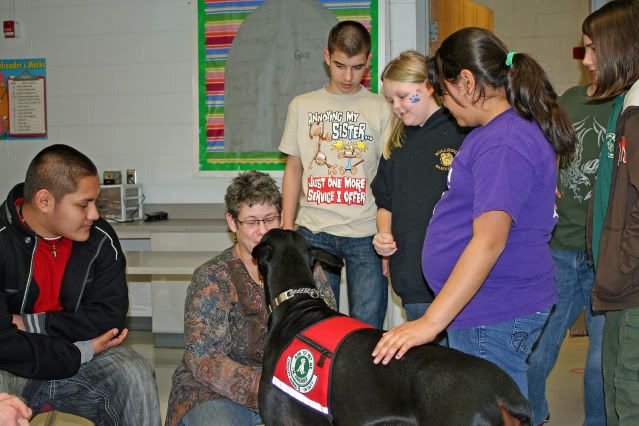
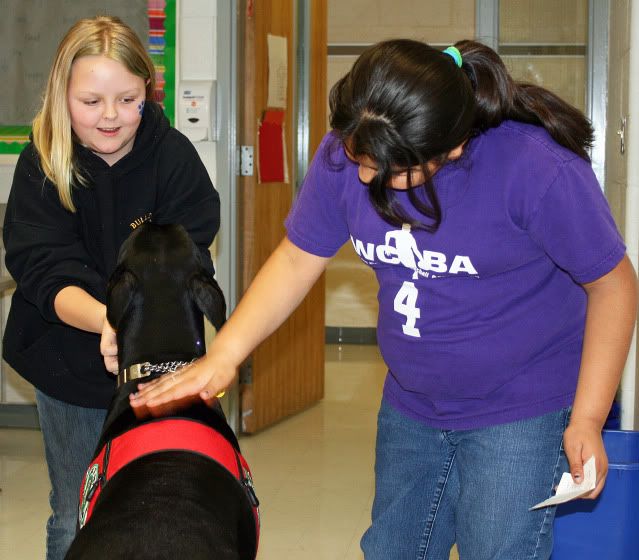

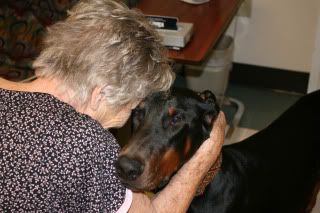
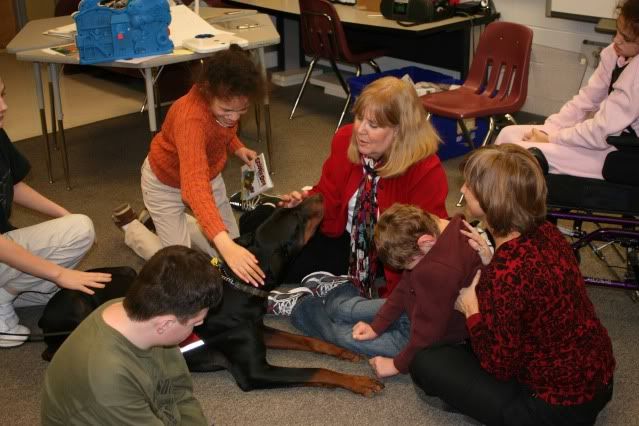
Hi - will you post this Blog at The Doberman Pinscher Community at vorts.com? Our members will love it!
ReplyDeleteIt's easy just cut and paste the link and it automatically links back to your website. You can also add Classifieds, Photos, Videos, etc. It’s free and easy…
We are looking for contributors to share stuff with our members. Please help.
Email me if you need any help or would like me to do it for you.
http://www.vorts.com/doberman_pinschers/
Thanks,
James Kaufman, Editor